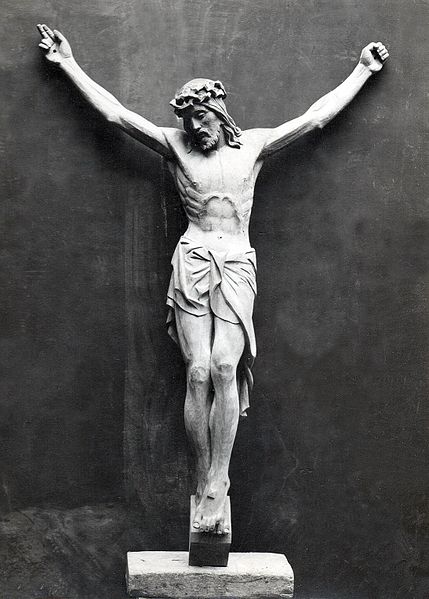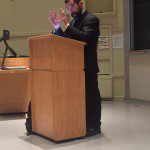Jesus said to his apostles:
“Whoever loves father or mother more than me is not worthy of me,and whoever loves son or daughter more than me is not worthy of me;
and whoever does not take up his cross
and follow after me is not worthy of me.
Whoever finds his life will lose it,
and whoever loses his life for my sake will find it” (Matt. 10.37-39).
It was early in my PhD. One of my colleagues had a friend come up from Birmingham and so invited a bunch of us round to his house. We’d all been drinking, and at one point, the conversation turned to who Jesus is. A colleague’s friend who’d been a Christian but turned from the faith brought up this passage from this week’s Gospel reading. I can’t remember just what he said, but it was something along the lines of: If some guy came up to me and told me I had to love him more than my parents or more than my (hypothetical) kids, I’d call him batshit crazy.
I couldn’t help but feel that he got it. He understood this passage better than many of us often do.
Following Christ often appears insane. It seems to contradict all the things this world tells us is good. What’s more, Christ tells us that we have to love him more than our most basic, fundamental social units. Christianity is a rational religion––how could it not be when we have been created and baptized into the One who is Reason––and yet our rationality often appears like madness to the world. So my lapsed acquaintance is right. This call appears like bullshit. But here’s the secret, the passage doesn’t end here.
The last two lines of the portion I’ve quoted above change the dynamic of everything Christ has said. Up until those lines, he has told us love me more; as if he is in real competition with our families, with our very lives. But then he tells us “Whoever finds his life will lose it,/and whoever loses his life for my sake will find it.” I think this passage applies to everything he’s said before. Whoever finds his mother and father will lose them, and whoever loses her mother and father for my sake will find them. Whoever finds her children will lose them, and whoever loses her children for my sake will find them.
Christ is not in competition with our loves, rather loving him allows us to rightly order our loves.
A professor of mine used to say that when people asked him, “Do you love your wife more or less than God?” he would answer, “I love God by loving my wife.” While it’s true that following Christ may cause us to lose friends and family, it’s not necessarily the case that it must be so.
Loving Christ will cause us to find our families and love them the way we ought.
Love is toxic when it’s disordered. That’s what Christ is trying to teach us. An internalized love, loving something too much or too little, a love that causes you to exclude others, is a toxic love. And I think that’s Christ’s point here. We see that in the rest of the Gospel reading:
“Whoever receives you receives me,
and whoever receives me receives the one who sent me.
Whoever receives a prophet because he is a prophet
will receive a prophet’s reward,
and whoever receives a righteous man
because he is a righteous man
will receive a righteous man’s reward.
And whoever gives only a cup of cold water
to one of these little ones to drink
because the little one is a disciple—
amen, I say to you, he will surely not lose his reward” (Matt. 10.40-42).
Christ has gone from telling us that we must lose everything for his sake in order to find it (“Aim at heaven and you’ll get earth thrown in,” as Lewis said). Now, he’s telling us about how we love him, which is by receiving him. When we receive him we receive the one who sent him, namely the Father. And he shows us who he is in relation to the Father by telling us what kind of reward we shall receive by receiving him (the implication being that his reward is above that of the prophet’s or righteous man’s). And then he tells us:
“And whoever gives only a cup of cold water/to one of these little ones to drink/because the little one is a disciple—/amen, I say to you, he will surely not lose his reward.”
Receiving Christ means receiving and caring for his disciples, those whom he has sent.
If all we had was this passage, we might think that this means only care for our fellow Christians. But later in the gospel of Matthew, we see this is not the case. When the sheep and goats are separated both will be judged on when they clothed the naked, fed the hungry, gave drink to the thirsty (and, if we read this in conjunction with the Sermon on the Mount as it appears in Matthew, when they got justice for those who hungered and thirsted for it). Clearly, we receive Christ when we meet him in the poor and the oppressed––and not just amongst our fellow Christians, but all poor and oppressed––and it is Christ we care for when we care for them. This is what it means to love Christ more, it means that we will love Christ by loving all others in his name and for his sake. Christ becomes the lens by which we see, the means by which we love. Only by loving through Christ, in Christ, and with Christ, can our love be rightly ordered. Only by loving Christ can we see the world rightly. Christ infects everything we do when we love him.
I pray he so infects me, even when it’s uncomfortable. I pray he so infects you too.
David Russell Mosley is Dean of Humanities at Holy Family Academy. He is the author of Being Deified: Poetry and Fantasy on the Path to God, and On the Edges of Elfland: A Fairy Tale for Grown-ups. He keeps a blog called Letters from the Edge of Elfland.













